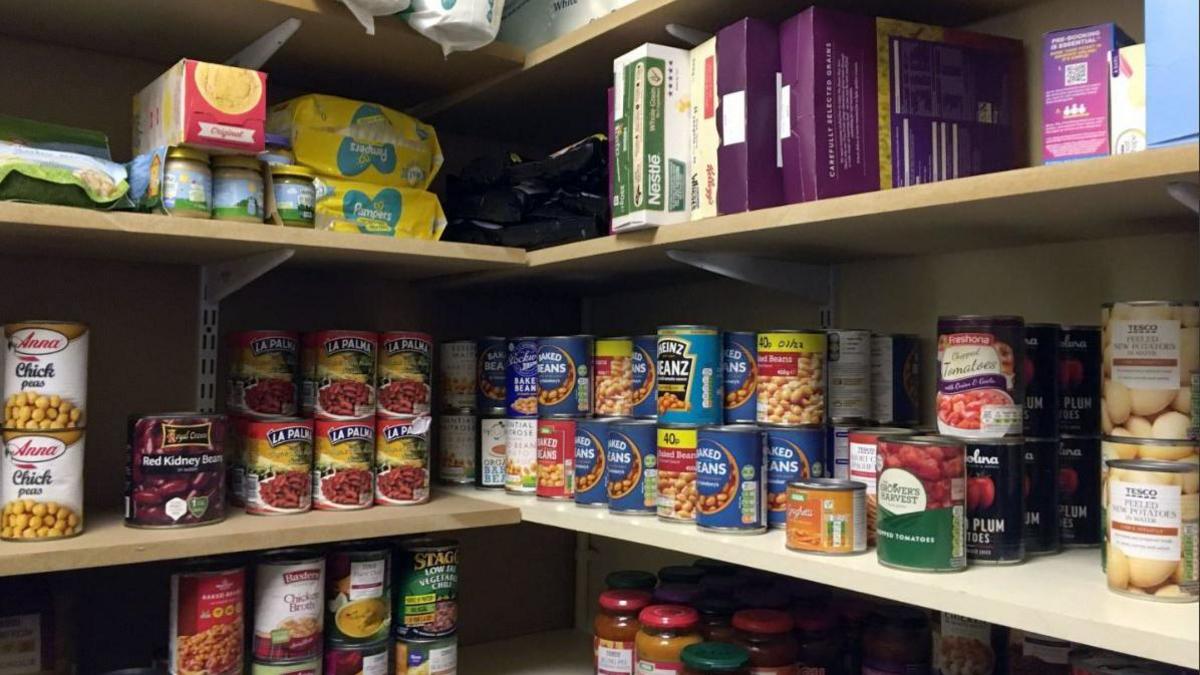Schools running more foodbanks than charitable groups

There are more than 4,000 school-based foodbanks in primary and secondary schools
- Published
Schools are now the biggest source of charitable food for struggling families as they are increasingly forced to step in to help, a new report has revealed.
Researchers found there are 4,000 school-based foodbanks in primary and secondary schools across England, which equates to one in every five.
Report lead author Dr William Baker, from the University of Bristol, said: "The fact schools are running foodbanks en masse is falling under the radar with no national support, guidance, or oversight."
A Department of Work and Pensions spokesperson said this month "benefits were boosted to support millions of people on the lowest incomes".
General secretary of school leaders’ union NAHT, Paul Whiteman, said that teachers are being forced to "dip into their own pockets to help families with food and clothing".
The report calls for greater awareness among policy makers and reform, including an overhaul of the social security system, to address the growing issue.
Dr William Baker said it is "shocking" that schools are being used en masse for foodbanks
Dr Baker said: “Our research shows there are now, quite shockingly, more foodbanks inside schools than outside of schools in England.
“Teachers and support staff see the devastating effects of poverty and the cost-of-living crisis daily, so they have felt compelled to act."
The survey data used in the study indicates foodbanks exist in more than a fifth (21%) of schools and this rises to a third (33%) in schools with the high numbers of students from deprived backgrounds.
Charitable and third sector organisations, chiefly The Trussell Trust and The Independent Food Aid Network, remain key players operating 1,646 and 1,172 foodbanks respectively.
But the latest data indicates schools now outstrip this, running an estimated 4,250 foodbanks.
Policy makers are largely unaware of the nature and scale of the problem, in contrast to previous high-profile media campaigns for universal free school meals and holiday food vouchers during the Covid-19 pandemic, the report claims.
Paul Whiteman said in recent years the NAHT has "increasingly heard from school leaders who are going above and beyond"
Mr Whiteman said in recent years his union has "increasingly heard from school leaders who are going above and beyond".
“The Government hasn’t done nearly enough to support children’s recovery from the pandemic, tackle the root causes of poverty, or properly invest in social care, which have all been under-funded over the last decade," Mr Whiteman said.
“Until this changes, we will continue to see worrying levels of poverty.”
'Boosted benefits'
A government spokesman said there are 1.1m fewer people living in absolute poverty compared to 2010, adding that its ÂŁ108bn cost of living support package prevented 1.3m people falling into poverty in 2022/23.
They said: “This month we boosted benefits and pensions to support millions of people on the lowest incomes and the Household Support Fund continues to provide vital support for those most in need.”
The report, Feeding hungry families: food banks in schools in England, has been published in the Bristol Working Papers In Education Series.
Related topics
- Published29 November 2023
- Published14 April 2023